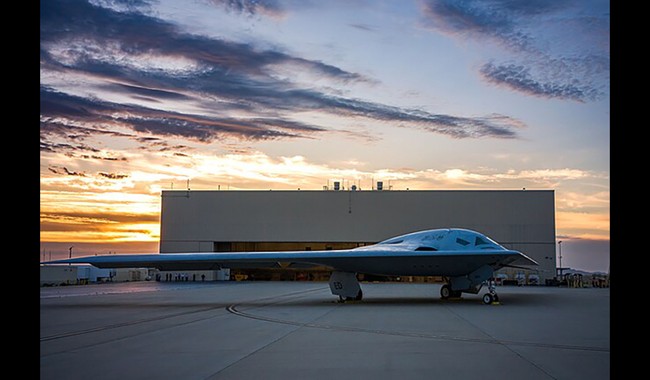
Stealth is a great force multiplier. For aircraft in particular, being invisible may well be better than being fast or agile, as was proved with the first-generation stealth F-117 in Operation Desert Storm. In the event of a major war, stealth aircraft can penetrate enemy airspace, proceed to strategic targets deep within enemy territory, and deliver steel on target.
The B-21 appears to be ready to redefine what stealth means. A recent paper from the Hudson Institute, which is advocating for the purchase and deployment of the B-21, claims that the new Raider has the radar cross-section of… an insect.
The multi-author paper from the Hudson Institute stresses the strategic deterrence potential of the Northrop Grumman B-21 based on its ability to penetrate the most sophisticated anti-access-area denial (A2/AD) defenses, its long range and flexibility.
While citing these qualities the paper argues that a planned buy of just 100 Raiders is too small to effectively deter U.S. adversaries or execute the necessary missions to defeat them.
These new bombers will, of course, carry a hefty price tag – even heftier when you consider that the republic is in hock to the tune of $35 trillion. But, unlike much of what the federal government spends our money on, operating a military is an enumerated, legitimate role of the federal government. What’s more, military technology does not exist in a vacuum. Powers unfriendly to the United States are also advancing their military equipment, including the development of stealthy aircraft.
The Hudson paper calls for doubling the original buy “as a starting point” and for plainly making Congress aware of the need for more B‑21s so that it can adjust funding and plan for additional production.
The authors note that another DC-based thinktank, The Center for Strategic and Budgetary Assessments, recommends constructing a Raider force capable of defeating two major powers simultaneously, suggesting that America procure 288 B‑21s. They added that, “A prominent former national security official projected the number to range from 300–400.”
Three hundred or 400 aircraft, stealthy or not, seems a more appropriate number to help meet the original United States Department of Defense goal of fighting and winning two major wars at once – something we did in 1945 and which not even the most starry-eyed optimist would think we have the capacity to do today, force multipliers notwithstanding.
See Related: U.S. Air Force’s Newest, the B-21 Raider Stealth Bomber, Makes Debut Flight
Air Force Reveals New B-21 Raider Photos – But Are the Pilots Up for the Moment?
Fortunately, it’s looking like the American taxpayers will be getting a bargain with the B-21 – at least, compared to the B-2.
Mackenzie Eaglen, a senior fellow at the American Enterprise Institute, makes a cost and sustainment argument for acquiring more B-21s using the B-2 for comparison.
Adjusted for inflation,” she says, “the average procurement unit cost (APUC) of a single B‑2 was $1.38 billion, while the APUC of a B‑21 is an estimated $706 million, roughly half the price.
The geopolitical picture around the globe is just a bit worrisome at the moment – and, yes, that’s some cosmic-level understatement. But the best weapons are those that we never have to use because the bad guys are looking at their capabilities and soiling themselves in terror, and that’s what tech like the B-21 is, in part, good for. Delivering steel on target is their primary role, yes, with a strong second being intelligence-gathering. But deterrence counts, too, and if the claimed capabilities of the B-21 prove to be accurate, these aircraft should be making Russia, China, and North Korea a little more reticent about pushing too many buttons when dealing with the United States.
Unless, of course, they are dealing with a cackling, vapid, ill-informed, and feckless President Harris. Then I won’t hazard any guesses.
You can see some interesting information about the B-21 in this video:

